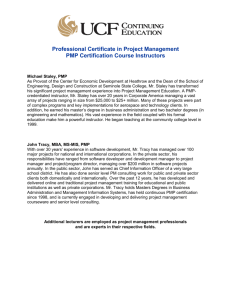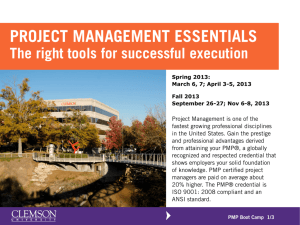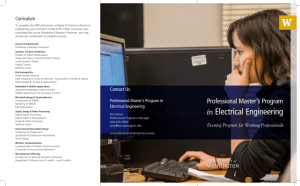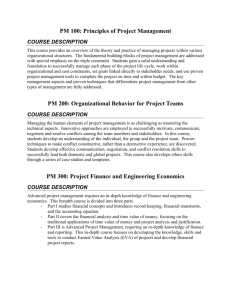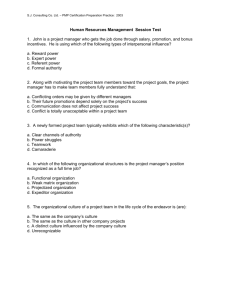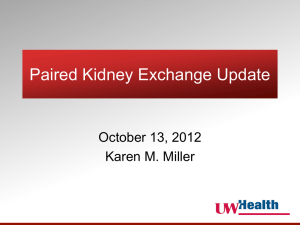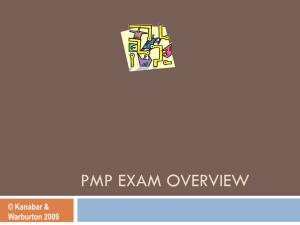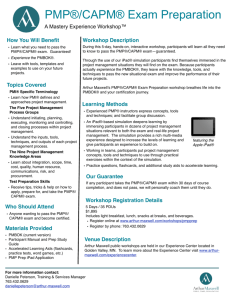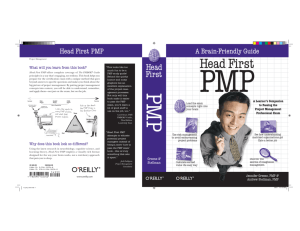PMPdistilled © Premium PMP preparatory program
advertisement
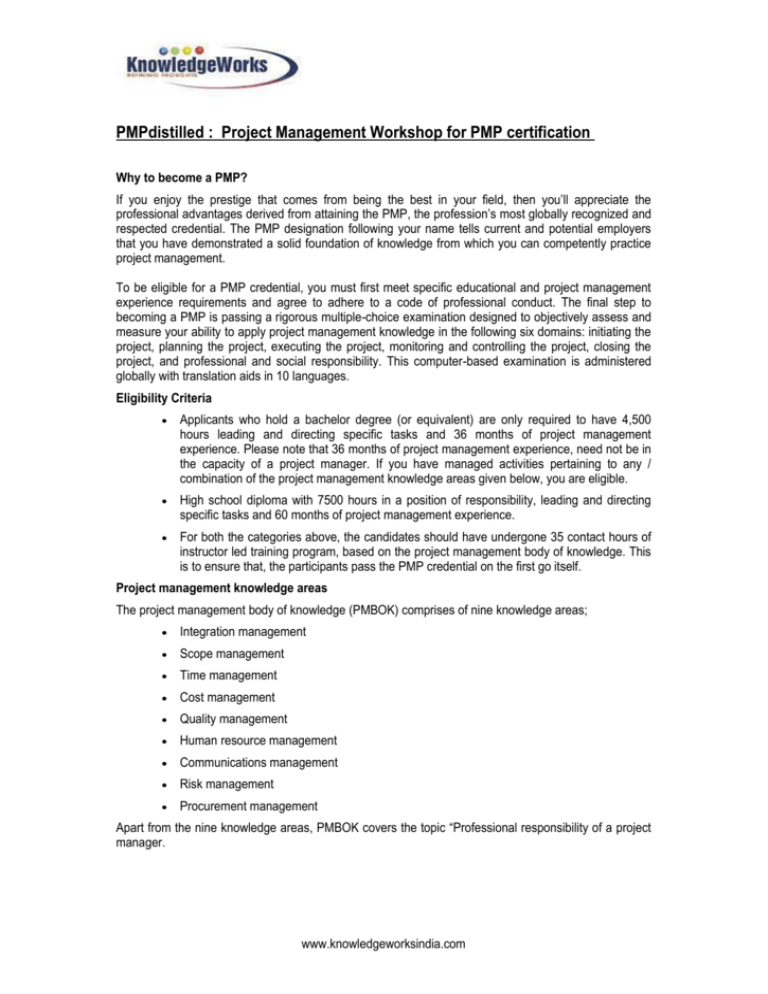
PMPdistilled : Project Management Workshop for PMP certification Why to become a PMP? If you enjoy the prestige that comes from being the best in your field, then you’ll appreciate the professional advantages derived from attaining the PMP, the profession’s most globally recognized and respected credential. The PMP designation following your name tells current and potential employers that you have demonstrated a solid foundation of knowledge from which you can competently practice project management. To be eligible for a PMP credential, you must first meet specific educational and project management experience requirements and agree to adhere to a code of professional conduct. The final step to becoming a PMP is passing a rigorous multiple-choice examination designed to objectively assess and measure your ability to apply project management knowledge in the following six domains: initiating the project, planning the project, executing the project, monitoring and controlling the project, closing the project, and professional and social responsibility. This computer-based examination is administered globally with translation aids in 10 languages. Eligibility Criteria Applicants who hold a bachelor degree (or equivalent) are only required to have 4,500 hours leading and directing specific tasks and 36 months of project management experience. Please note that 36 months of project management experience, need not be in the capacity of a project manager. If you have managed activities pertaining to any / combination of the project management knowledge areas given below, you are eligible. High school diploma with 7500 hours in a position of responsibility, leading and directing specific tasks and 60 months of project management experience. For both the categories above, the candidates should have undergone 35 contact hours of instructor led training program, based on the project management body of knowledge. This is to ensure that, the participants pass the PMP credential on the first go itself. Project management knowledge areas The project management body of knowledge (PMBOK) comprises of nine knowledge areas; Integration management Scope management Time management Cost management Quality management Human resource management Communications management Risk management Procurement management Apart from the nine knowledge areas, PMBOK covers the topic “Professional responsibility of a project manager. www.knowledgeworksindia.com About the PMPdistilled 3 days program To be successful at the real PMP credential examination, one need to have project management experience, complete understanding of the key project management processes of PMBOK and last but not the least – hands on exam practice. Based on our understanding of these critical success factors, we designed and developed the PMPdistilled program, which comprises of three components; PMPdistilled Structure Component Objective PMP essentials This is a 100% online module, comprising of podcasts, reference material and a couple of online tests. At the end of this module, the participants will have a basic understanding of the key definitions of project management. Approximate time required – 8 hours. PMP face2face During this 3 day class room training, the participants will gain a complete understanding of all the processes of the project management body of knowledge. The class room training comprises of a case study, presentations, exercises and lesson tests, day end tests and a full fledged PMP simulation test. PMP exam readiness The objective of this module is to support the participants for 30 days after the completion of the PMP face2face module. During this phase, the participants are given access to the pre-exam kiosk, which comprises of knowledge area wise tests and a 4 hour PMP simulation test. Participants are encouraged to practice these tests and both the participant and the instructor can monitor the scores, based on which individualized action plans are drawn out. www.knowledgeworksindia.com PMPdistilled : 3 days structure Modules & Processes Coverage Lesson 1 Project management framework Understanding the project management environment Project management structure, systems, style, staff, skills, strategy and shared values Lesson 2 Initiating a project Develop project charter, Develop preliminary scope statement The key project management tasks covered include; selecting a project , define high level scope, define project charter Lesson 3 Planning a project Develop project management plan, scope planning, scope definition, create WBS The key project management activities covered include; project scope planning, detailed scope definition, product analysis techniques, stakeholder analysis, work breakdown structure, decomposition, work packages, wbs dictionary, code of accounts Lesson 4 Developing project schedules, cost estimates and budgets Activity definition ,activity sequencing, activity resource estimating, activity duration estimating, schedule development The key project management activities covered include; create an activity list, create a project network diagram, acquire activity duration estimates, identify the critical path, critical chain, develop a project schedule, determine resource requirements, estimate project costs, establish a cost baseline. Lesson 5 Planning project quality Quality planning definition of quality, TQM, cost of quality, cost benefit analysis, benchmarking, design of experiments, 7 QC tools, quality management plan, quality metrics, quality checklists, quality baseline Lesson 6 Planning human resources Human resources planning, Communication's planning Organizational charts and position descriptions, responsibility assignment metrics, RACI chart, Organizational theories - theory X, theory Y, Vroom's theory, Maslow's hierarchy of needs, Project interfaces , networking, formal and informal networks, staffing management plan Communication planning, stakeholder's communication requirements analysis, communication's channels, barriers to effective communication, communication management plan, communication technology www.knowledgeworksindia.com Lesson 7 Risk management planning , Risk identification , Qualitative risk analysis, Quantitative risk analysis, Risk response planning Analyzing risks and planning risk response planning meetings, business risk Vs insurable risks, effect based risk classification, source based risk classification , level of uncertainty, risk management plan, risk identification, risk analysis , qualitative risk analysis, risk thresholds, risk tolerance , documentation reviews, information gathering techniques, checklists, assumption analysis, diagramming techniques, brainstorming, delphi, interviews, SWOT, risk probability and impact , risk register, probability scale, impact scale, probability/ impact risk matrix , quantitative risk analysis , sensitivity analysis , decision tree analysis , risk response planning , risk response strategies. Lesson 8 Planning project procurement Plan purchases and acquisitions, Plan contracting contract types, make or buy analysis, plan contracting, procurement documents Lesson 9 Executing the plan Direct and manage project execution, Perform quality assurance, Acquire project team ,Develop project team , Information distribution , Request seller responses , Select sellers Lesson 10 work authorization system, project management information systems, quality audits, acquire project team, develop project team, collocation, virtual teams, rewards and recognition, training, team building, stages of team development, conflict management, information distribution, request seller responses, select sellers, contract negotiation, weighting system, screening system, independent estimates, stages of contract negotiation Monitoring and controlling the project Monitor and control project work , Integrated change control , Scope verification , Scope control , Cost control , Perform quality control , Manage project team , Performance reporting , Manage stakeholders , Risk monitoring and control , Contract administration earned value management system, forecasts, causes of project changes, integrated change control, scope verification, inspection, formal acceptance, scope control, schedule control, earned value management, cost control, control project quality, application of 7QC tools, random or common causes, special or assignable causes, seven run rule, statistical sampling, manage project team, project performance reporting, manage stakeholders, risk monitoring and controlling, contract administration Lesson 11 Close project Contract closure Lesson 12 authorize contractors work, performance reporting, perform quality control, integrated change control, risk monitoring and control, administrative closure procedure, contract closure procedure, procurement audits, contract management system Professional responsibility professionalism, responsibilities to the profession, certificated professional practice, advancement of the profession, responsibilities to customers and the public Lesson 13 PMP exam strategies Tips to answer, PMPdistiller decision tree for arriving at the most correct answer, simulation test www.knowledgeworksindia.com

